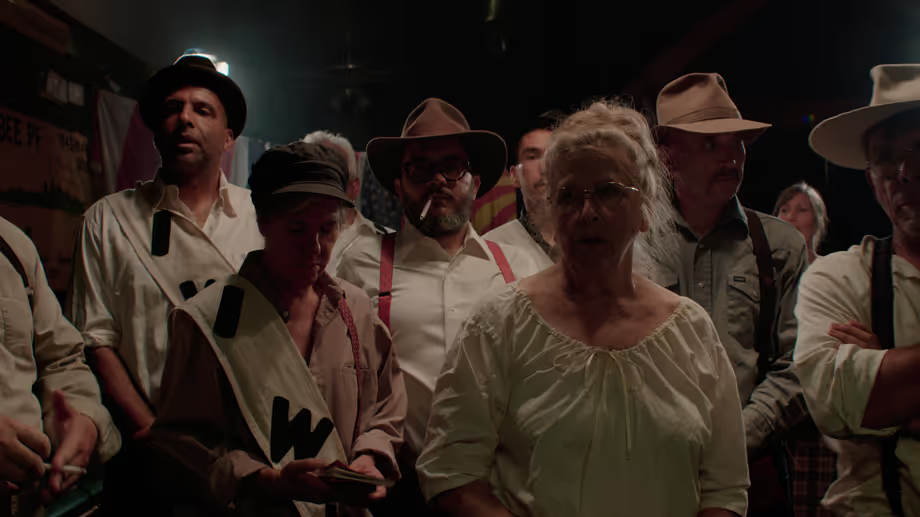Bisbee '17: Discussion Guide Discussion Prompts: The Original Event
Discussion Prompts: The Original Event

What did you learn from the film about the Bisbee deportation? How did those who ordered or carried out the deportation justify their actions? What were the stated and actual motives of the mining company, the sheriff, and the IWW?
The Ray family, whose grandfather and uncle were on opposite sides of the deportation, say they understand the perspectives of both sides: the miners who protested low wages and unsafe working conditions, and those who believed it was their patriotic duty to continue mining in support of the nation’s war efforts. Could the mining have continued without the deportation? Do you share the Rays’ neutral view? Why or why not?
Dick Graeme argues that the deportation “was not an anti-immigrant move. It was not a labor-busting move. It was let’s make our community safe for the women, for the children, for the mines. Let’s support the war effort in Europe; our sons that we sent over.” Compare this to Dan Frey’s conclusion that the deportation was “in the nature of an ethnic cleansing.” How do you account for the contradictory views?
Dan Frey, a member of the Bisbee deportation centennial committee, notices that the names of those who were deputized are nearly all Anglo Saxon, “so my conclusion after all this research: The deportation was not [only] a response to a labor action…It was also in the nature of an ethnic cleansing…Walter Douglas decided [to] make this an American camp [and] get all these aliens out of here.” Later, reenactor Fernando Serrano quotes historical material on the event: “During the deportation about 90% of the deportees were born outside of the United States [and most of those were] either Mexican or eastern European—the men who had always been at the margins of the white man’s camp.” Beyond the scenes in the film, what further evidence would you need to decide whether the deportation was motivated by racism? What do you think it felt like for the people remaining in Bisbee who were not white? How might the deportation have changed the way white people in Bisbee saw themselves?
Dick and Doug Graeme believe that the IWW was “too radical.” How does the Bisbee deportation square with your understanding of First Amendment rights? Should the government be allowed to ban speech or public demonstrations that represent views they deem dangerous? In a community, who should decide what views are considered dangerous?
As a member of the commemoration’s research committee, Mike Anderson (a former journalist who is historian of the ballpark where opponents of the mine owners were corralled before they were put on trains) found that, “The general impression that the media at that time gave, and remember the media was controlled by the money companies in Arizona, was that these are Wobbly agitators. That’s the impression I had for a long time too.” What role does the media play in our understanding of historical events and current conflicts? How is their framing of issues related to their revenue sources? What lessons does the history of Bisbee offer about media ownership and influence?
It appears that the Sheriff acceded to the requests of mine manager Walter Douglas rather than protecting the strikers. What structures facilitated that alliance? Do you think it would be the same today? Would law enforcement be more likely to defend protesting workers or their employers? What makes you think so?
In the reenactment, though Fernando explains the injustice he faces, his mother urges him not to join the strikers:
“I am very proud of you. And you are a good man. And I love you so much. But I’m so mortified, son. This place is good for us. And I’m mortified that you want to be part of the strike. We came from Mexico. That is not a good place for us. We just got back from there, and there is a revolution. We have to stay here. You have a good job…rights are important, but our family is more important, son. That we are together. They can hurt you, son. You know that I’ve lost one son…listen to me, please. I don’t want to lose you. Don’t be a part of the strike, son.”
Imagine that your child (or parent) was contemplating joining the strike. What would you say to them? How about if your child (or parent) was volunteering to be deputized? What would you say in that case?
Each side of the conflict accused the other of being “unpatriotic.” How do you define patriotism? Were the striking workers unpatriotic? How about the mine owners and managers?
How do you think the mine owners developed an alliance with many of Bisbee’s middle- and working-class residents in opposition to the immigrant mine workers? How do you think these anti-union residents felt about the owners and the immigrant workers before the strike? What role do you think race played in these dynamics? Is there a way to reframe the conversation to consider the shared interests of the deputized citizens and the deportees?
